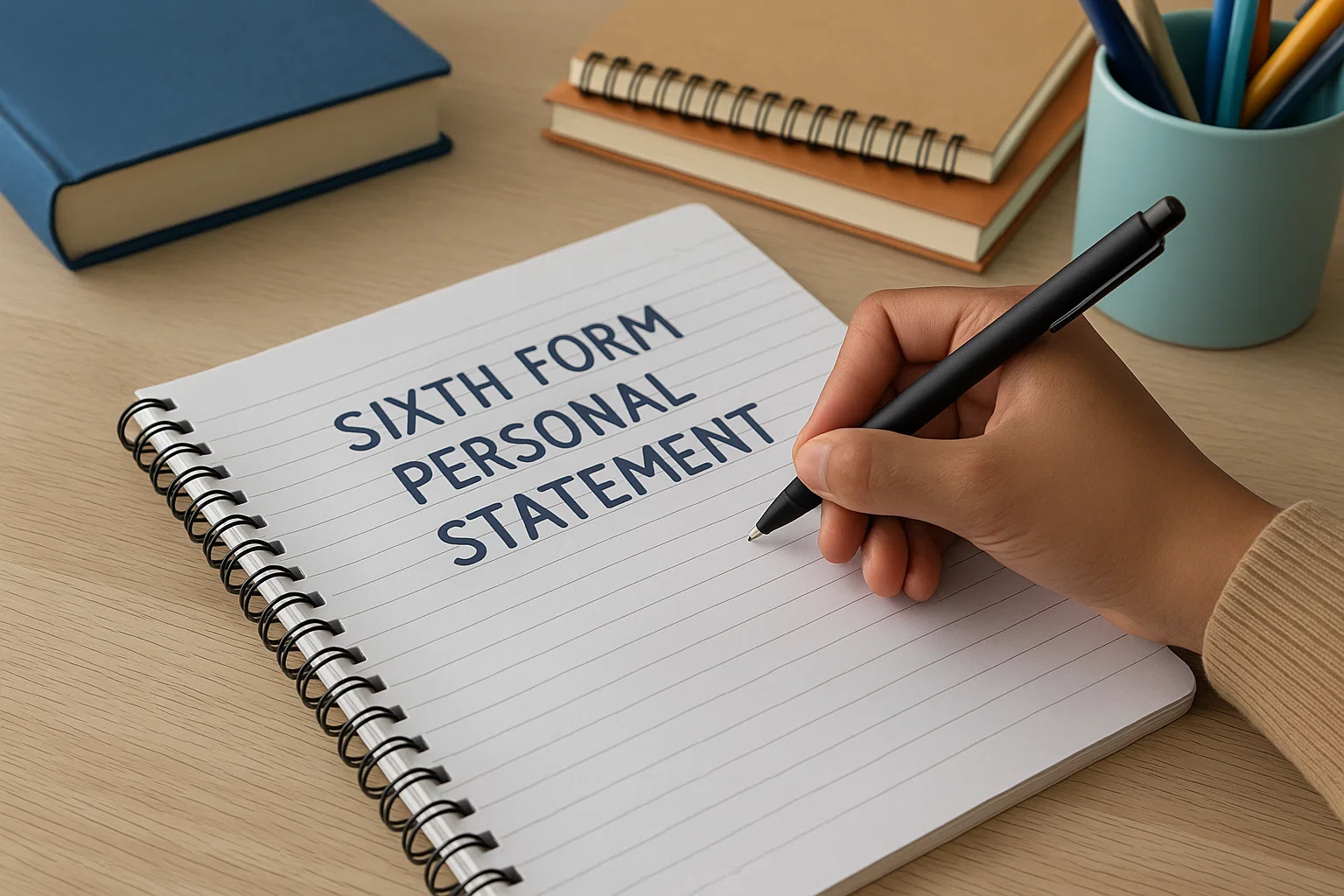This guide breaks down everything you need to know: from starting strong, sticking to the right length, using the 80/20 rule, and polishing your draft until it shines. Think of this as your practical roadmap, not just theory, but advice you can use right now.
What Is a Sixth Form Personal Statement?
At its core, a personal statement is a short written piece where you explain why you want to study certain subjects and why you’ll do well in them. It’s like a mini-interview on paper.
Sixth form colleges and schools don’t expect you to have your life planned out, but they do want to see that you’ve thought about your choices. They’re looking for clues that you’re motivated, capable, and ready for the next challenge.
In plain English: it’s less about big fancy words, more about showing you’ve got genuine interest and potential.
How Do You Start a Personal Statement for Sixth Form?
This is where most students freeze. That first line feels impossible, right? But here’s the trick, don’t try to be Shakespeare. You don’t need a poetic quote or a dramatic life story. You just need to be real.
A strong opening could be:
Subject-driven: “Ever since I started coding in ICT, I’ve been fascinated by how small lines of code can solve big problems.”
Career-driven: “My ambition is to become a physiotherapist, which is why I’m drawn to Biology and PE at A-level.”
Curiosity-driven: “I enjoy asking questions that don’t always have easy answers, which is why History appeals to me.”
What you shouldn’t do is start with clichés like “I have always been passionate about…” or “Since I was born, I have loved maths.” Teachers and admissions staff see those every single year.
How Long Should a Sixth Form Personal Statement Be?
Here’s the good news: it doesn’t need to be an essay. In fact, shorter is better, as long as it’s sharp.
Aim for 300–500 words, or around half a page to a full page. That’s plenty of space to show motivation without drifting off-topic.
Remember, admissions tutors have dozens (sometimes hundreds) of statements to read. Clear, concise writing will win you more points than long rambling paragraphs.
Think of it like Twitter versus an essay: the best statements get to the point quickly, but still have substance.
Structuring Your Personal Statement (The 80/20 Rule)
One of the best frameworks you can use is the 80/20 rule:
80% Academic & Subject-Focused
Talk about why you’ve chosen these subjects, what skills you bring, and where you see them taking you. For example, if you want to study Physics, mention your problem-solving skills and how you enjoy experiments.20% Personal Interests & Character
Add a touch of your personality, hobbies, achievements, or interests that show you’re well-rounded. For instance, being part of a sports team demonstrates teamwork and commitment, even if you’re not studying PE.
Why does this balance work? Because sixth form applications are mainly about your studies. Too much about football or gaming and you risk looking unfocused. Too little personality and you risk sounding robotic.
Example of a Good Sixth Form Personal Statement
Here’s a short example to show how it all comes together:
“I am applying to study English Literature, History, and Sociology because I enjoy exploring how stories, events, and societies shape the world we live in. At GCSE, I achieved strong results in these areas, and I particularly enjoyed analysing texts in English where I developed critical thinking skills. Outside the classroom, I am part of my school’s debating club, which has improved my confidence and ability to express ideas clearly. I believe these skills will help me succeed at sixth form and prepare me for studying law in the future.”
Notice what this example does:
It explains why they’re choosing the subjects.
It highlights relevant skills.
It drops in a personal activity that shows transferable skills.
It ends with ambition for the future, without sounding forced.
That’s the kind of balance you should aim for.
Common Mistakes to Avoid
Even the brightest students can trip up here. Watch out for these pitfalls:
Overusing clichés – If your statement sounds like every other one online, it won’t stand out.
Being too casual – This isn’t a WhatsApp message. Write in a clear but professional tone.
Talking only about hobbies – Yes, your love for gaming or baking is great, but it can’t be the main focus.
Going off-topic – Stick to your subjects, skills, and goals. Waffling loses impact.
Copying templates – Teachers can spot a copy-paste job a mile away.
Editing and Proofreading Tips
Even the best draft will need polishing. Here’s how to fine-tune yours:
Read it aloud – If it sounds awkward when spoken, rewrite it.
Check spelling and grammar – Small mistakes make a big difference.
Ask for feedback – A teacher, friend, or parent can spot what you missed.
Trim the fat – Cut out filler words. Every sentence should earn its place.
Editing isn’t about making it longer. It’s about making it cleaner and sharper.
Final Checklist Before Submission
Before you hit “submit,” run through this mental checklist:
Have I explained why I chose these subjects?
Have I shown my strengths with real examples?
Is it under 500 words?
Does it sound like me, not a template?
Have I balanced academics with personal interests?
Did I proofread at least twice?
If you tick all those boxes, you’re ready to go.
Conclusion
Writing your sixth form personal statement doesn’t need to be stressful. Think of it as your chance to show who you are and where you want to go. Keep it authentic, keep it concise, and don’t overthink it. Sixth forms aren’t looking for perfect people, they’re looking for students with potential, curiosity, and a bit of drive.
So take a deep breath, draft your first version, and remember: it’s better to sound like you than to sound like a polished robot.

Oliver Bennett, with his Master’s degree from Manchester Metropolitan, is our in-house SEO specialist. At Spinbot UK Blog, he focuses on optimizing content to achieve the highest search engine rankings and edits articles to ensure they meet the highest standards of clarity and precision.

This is such an important reminder and one that I needed to hear today Thank you for always providing timely and relevant content
Thank you for the awesome content, it’s always appreciated